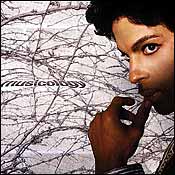
Prince is pop’s great polymath, but for too long he’s allowed his more expansive instincts to nearly swallow him whole. Prince’s fans, naturally, have stayed with him, eagerly downloading his online-only projects and snapping up his second-rate output, while everyone else has grown impatient with records that, since the underrated dark funk of 1994’s Come, have been too experimental, too packed with ideas, or simply too long. Even individual songs choked on their own ambition: “Joint 2 Joint,” from 1996’s Emancipation, was a nearly eight-minute-long muddle of hip-hop breaks, P-Funk-style harmonies, and a recording of Prince eating Cap’n Crunch. His 1999 boxed set, Crystal Ball, was so amateurishly put together that it made the Talking Heads’ recent, overblown retrospective seem essential. Prince’s tours, meanwhile, have been built around unsatisfying medleys of his eighties hits that have come to sound dated and almost Vegas-y.
All of which makes the sudden surge of good feeling for Prince—an induction into the Rock and Roll Hall of Fame, the sold-out shows at the Garden in July—a little strange. His past is certainly worth celebrating, but is there anything about Prince’s current work that warrants attention?
For the first time in a decade, that question can be answered in the affirmative, thanks to Musicology, his latest album and his first on a major label since 1999. Despite its off-putting title, which promises the sort of pedagogical funk that Prince has been schoolmarmishly peddling with Sly and the Family Stone bassist Larry Graham over the past few years, Musicology is a thrilling, electric statement by an artist who just might be building toward another creative peak.
“Prince returns to what he’s so masterfully good at: songcraft and groove.”
His digressive impulses held in check, Prince returns to what he’s so masterfully good at: songcraft and groove. Both the title track and “Illusion, Coma, Pimp & Circumstance” riff on the mechanized funk of early-seventies James Brown, but with some radical left turns: skeletal guitars, spooked-out synths, and even a sample of his own hits. “Illusion,” in particular, is wonderfully weird: Prince sings in an off-kilter, nasal screech that reminds us of the vocal risks he used to take, like when he assumed the feminine voice (which he dubbed “Camille”) on “If I Was Your Girlfriend,” from his double-album masterpiece, 1987’s Sign ‘O’ the Times.
But it’s the ballads and love songs that make Musicology matter. On recent albums, Prince’s slower tunes were either covers (Bonnie Raitt’s “I Can’t Make You Love Me,” the Stylistics’ “Betcha By Golly Wow”) or torrents of overemotiveness (“The Greatest Romance Ever Sold”). But like his earliest material—such as the honest, direct “When You Were Mine”—the sentiments on Musicology are simple and much more powerful. Listeners can feel the romantic longing of “If Eye Was the Man in Ur Life” and “A Million Days”; Prince, for the first time in a long time, isn’t overdoing it with pointless and obtuse metaphors. And the music behind it—all hard-charging piano and soaring guitars—is as inspired as his lyrical ideas.
Musicology is a brave departure for an artist who has rested comfortably on nostalgia for albums (Purple Rain in particular) he knows weren’t as great as some of his fans remember, while often trying to present himself as a helpless victim of the record industry (he used to describe himself as a slave).
Musicology’s strength should have implications far beyond the record stores: It should give Prince the confidence to avoid the shameless audience-pleasing rituals he often practices on tour (the nadir came at Madison Square Garden a few years back, when, instead of engaging in the joyous call-and-response he’s famous for, he repeatedly asked the audience if it loved him) and to delve deep into unexplored songs like “Ballad of Dorothy Parker” that offer far greater interpretive space than his standards. Perhaps the surprisingly great Musicology will at last allow Prince to free himself, not from music-industry subservience but from a museum-like reverence for funk and soul and a back catalogue of hits that dog him like overeager fans.